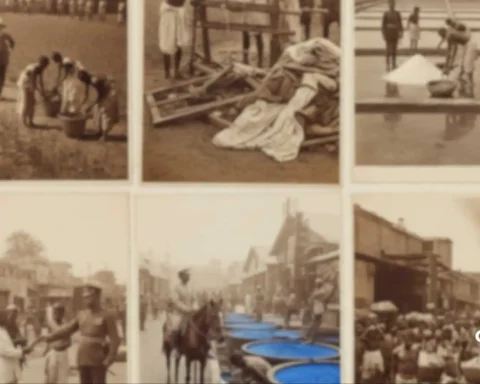How did surveys become important under the colonial administration? It is a question that is intricately related to the way the British understood governance in India. The perception the British had was that the administration of a country required its careful study and documentation before it could be administered. By the nineteenth century, the British conducted relatively detailed surveys that mapped the entire country. These included revenue surveys conducted in villages documenting topography, soil conditions, vegetation, wildlife, oral histories, and cropping patterns. Beginning in the later years of the century, census operations conducted every ten years were introduced. These surveys provided the British with extensive and detailed information about India’s resources, demographic data, and socio-economic structure.
Table of Contents
The Role of Surveys in Colonial Governance
How did surveys become important under the colonial administration? Surveys were an important part of the British colonial administration because they became the basis for their systematic governance and control. The British definitely felt that if they were ever to govern a country as vast and diverse as India, they needed accurate, precise, and systematic information. Without proper knowledge of the territory, resources, and people, they couldn’t really hope to administer effectively. As a result of this belief in the necessity of knowledge, many surveys were conducted, among which the revenue surveys were by far the most important.
Revenue surveys were conducted within villages and consisted of a survey of location, topography, soil, flora, fauna, local histories, cropping patterns, etc. The primary aim was to determine the agricultural “potential” of a particular area, so the British could fix how much tax was placed upon the land. This also effectively enabled the British to more efficiently collect a tax, develop agricultural policies, regulate the use of land, and ultimately require that certain crops be cultivated over others.
These surveys were also closely tied to economic exploitation. By locating and mapping India’s geographical and agricultural resources, the British could identify resources and subsequently facilitate their extraction for trade and industry. The surveys documented forests, minerals, and arable land, not for the benefit of the local population but for British economic advantage.
The question of “How did surveys become important under the colonial administration?” also connects to their political function. They were used to classify and categorize communities, track changes in populations, and create a fabricated sense of order. They provided the British with power as they instituted policies that maintained the order and control of Indian society overall under British rule to deny the potential for resistance.
These surveys, as we have learned through historical studies and educational video products, were framed as scientific and progressive, even if, beyond the nominal purpose underpinning the survey, there was the notion of control. As the British would have it, by converting knowledge into power, the aim of the colonial government was to ensure that whatever land and people remained in India were put at the service of imperial interests.

How Did Surveys Become Important Under the Colonial Administration?
The usefulness of surveys under colonial authorities resided in their ability to effectively combine systematic information gathering with economic and political control. So, how did surveys become important under the colonial administration? This can be understood from the British belief that a country must be properly known before it can be governed. Surveys provided one of the mechanisms for obtaining accurate and detailed knowledge about land, resources, and people in India, as well as bringing stronger governance over colonial rule.
By the early nineteenth century, the British had started to conduct detailed surveys to map the entire country. Revenue surveys were among the most significant. These were conducted in each revenue village and established a record of the topography, soil conditions, flora, fauna, local traditions, and cropping patterns. These surveys were done primarily to establish agricultural potential and assign correct tax rates. These surveys also established control over land usage and informed decisions on economic priorities, while also ensuring taxation revenue could be collected for colonial administration.
In the last quarter of the nineteenth century, censuses every ten years were introduced. The censuses were comprehensive head counts of populations that not only numbered people but also documented castes, religions, occupations, etc. The data allowed and enabled the British to formulate policy, create social divides, and control resources in India that served their interests. The British census of matter could lock in and strengthen caste classifications by intensifying social divides, which consistently limited unification amongst Indians and worked for the British.
The British scope of surveys extended well beyond tax and population inventories. The British undertook botanical, zoological, archaeological, anthropological, and forest surveys as well. Botany and zoology surveys helped extract India’s biodiversity for its trade and industries. Archaeological surveys were for the preservation (for further use) of any monument they deemed fit for protection, to inject themselves as preservers of Indian heritage, or to invoke the romance of the British Raj. The forest was mapped to map soils, land, and control timber/tree classes through imposed ordered land use and strict forestry laws that only benefited British industry.
As we have seen in historical studies and educational national resources, the answer to “how did surveys become important under the colonial administration” also lies in the fact that these surveys were presented in the name of science and modernity, but their deeper meaning was the consolidation of imperial power and economic extraction. By turning knowledge into a weapon of authority, the British accounted for every aspect of India’s land, people, and resources, securing the maximum benefit from what it had to offer. In other words, surveys were more than just bureaucratic duties; they were among the most powerful tools of colonial domination.
Types of Surveys Conducted by the British
The types of surveys carried out by the colonial administration were numerous and demonstrated the British desire to learn, regulate, and utilize all aspects of India. So, how did surveys become important under the colonial administration? This is evident in the fact that they were not limited to methods that only pertained to one field of practice but were acts of surveying that included investigation of land, personal lives, culture, and ecological factors. Surveys in general acted as a means of documentation that aided the British for the purposes of governance as well as domination.
Revenue surveys evolved as what could be considered the most significant of all of our surveys. Revenue surveys pertained to villages and took an interest in the agricultural ability, land quality, and crops of that area. The main component of a revenue survey was to establish a taxation rate that would support maximum revenue.
Census surveys began later and were created in the late nineteenth century and continued on a ten-year basis. Census surveys took a holistic look at the population and surveyed smaller aspects, including castes, religions, and occupations. Again, these surveys fortified the strength of British categorization, which gave them the ability to further divide the diverse interplay of communities that often reinforced social hierarchies in India.
Botanical and zoological surveys conducted during this same time sought to globally catalogue plant and animal species and use them for industrialization or commercial value. Archaeological surveys maintain documentation, or surveying monuments, while providing historical preservation. They also often documented a British component as preserving Indian heritage. Ultimately, they documented which sites had heritage value.
Anthropological surveys characterized communities, tribes, and cultural practices, which ultimately perpetuated stereotypes that accommodated colonial administrations. Forest surveys identified trees with timber potential, which resulted in proclamations of forest laws that pursued British economic investments over local considerations.
These surveys served a dual purpose: acquiring scientific knowledge and facilitating state governance through scientific knowledge. The answer to “How did surveys become important under the colonial administration?” also lies in their ability to disrupt local economies, relocate communities, and dismantle traditional systems of life under the guise of scientific progress.
By documenting India’s land, resources, and inhabitants, the British were able to create a very large repository of information that allowed them to govern with great precision. However, such precision was for their imperial ends, with the prioritization of economic extraction, continued political control, and the development of colonial power.
Conclusion
To answer “How did surveys become important under the colonial administration?”, one needs to recognize that these surveys were integral to the system of British governance in India. Surveys were the means through which British authorities determined and collected data on land, people, and resources, whereby they recorded what administrative systems they would create and where they would promote taxes. There was barely anything in colonial India that would not be documented, whether through revenue surveys, census operations, or even scientific cataloguing.
For sure, concealment of knowledge may describe the way in which colonial archives protected information, however, this too became a point of concern when we consider how colonial surveys and colonial catalogues, which were disguised as simply neutral ways to access ‘knowledge,’ were deeply involved in imperial power relations and in the systematic exploitation of India’s wealth. The surveys also serve as a haunting reminder that knowledge is a means to an end of wielding power.

FAQs
Why is a survey important in colonial governance?
The colonial administration needed to find out how much land it had and to whom it belonged. Surveys provided measurement to determine the size of land, allowing for the possible collection of land taxes or revenue from landowners. Surveyors mapped out villages and accumulated land records for villages, forests, and woodlots.
Why is surveying important, and what are its uses?
One of the main advantages of surveying is that it can produce more precise and reliable information. Surveyors at all levels can produce precise measurements for any purpose, whether you need to map out topography, determine property lines, or align roads and structures. Surveyors provide very clear and precise measurements, which are the basis on which all design or construction work decisions will rely.
Why are surveys valuable in our society?
Surveys provide researchers with verifiable, usable, primary data to help with business decisions. They are important because the data comes directly from the very individuals you have identified as part of your objective. And surveys provide an organized, formal way to view and manipulate your data.









